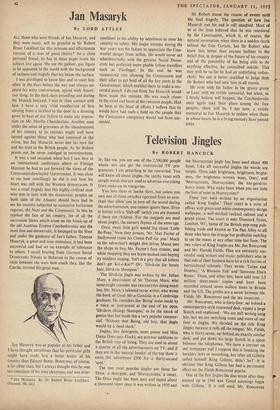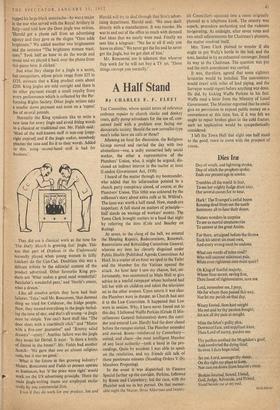Television Jingles
By ROBERT HANCOCK IF, like me, you are one of the 2,500,000 people whose sets can get the commercial TV pro- grammes, I am preaching to the converted. You will know all about jingles, the catchy tunes with simple words that are used to advertise everything from make-up to margarine.
You love them or loathe them, but unless you own one of those switches operated from an arm- chair that allow you to turn off the sound during the advertisements, you cannot ignore them. Even in homes with a 'blab-off' switch you are doomed if there are children. For the moppets are mad about jingles, the nursery rhymes of the atom age.
Once, sweet little girls would lisp about 'Little Bo-Peep.' Now they scream, 'Mr. Max Factor of Hollywood made his Creme Puff for you.' Much to the advertiser's delight this drives Mums into the shops to buy Mr. Factor's face creams, and while shopping they are brain-washed into buying by toddlers singing, 'Isn't it a pity that all kittens don't get K it-e-Kat?' Or: 'Silvikrin for lovely hair, Silvikrin Shampoo.'
The Silvikrin jingle was written by Mr. Julian More, a descendant of Sir Thomas More, who some might consider was executed for doing much less. Mr. More, a talented revue writer, who wrote the book of Grab Mc a Gondola, is a Cambridge graduate. He considers the 'Boing' noise made by a voice or instrument at the end of his opus, `Silvikrin (Boing) Shampoo,' to be the touch of genius that has made this a very popular commer- cial. 'Without that Boing, old boy, that jingle would be a dead duck.'
Jingles, like detergents, atom power and Miss Diana Dors (nee 'Huck), are postwar additions to the British way of living. They are used in about a quarter of all the advertisements on TV, and if they are in the 'natural breaks' of the top show it costs the advertisers £500 for a thirty-second 'spot.'
The two most popular jingles are those for 'Omo,' a detergent, and 'Murraymints,' a sweet. The Omo jingle has been seen and heard about a thousand times since it was written in 1950 and the Murraymint jingle has been used about 400 times. Like all successful jingles the words are simple. 'Omo adds brightness, brightness, bright- ness, the brightness women want, Omo,' and 'Murraymints, Murraymints, the too-good-to- hurry mints. Why make haste when you can taste the hint of mint in Murraymint?'
These two were written by an organisation called 'King Jingles.' Their court is a suite of offices with green-and-white contemporary-design wallpaper, a well-stocked cocktail cabinet and a grand piano. The court is near Denmark Street, London, WC, home of the British pop-song pub- lishing trade and known as Tin Pan Alley to all those who have the strange but profitable inability to see the moon at any other time but June. The two rulers of King Jingles are Mr. Joe Roncoroni and Mr. Harold Fields. They are extremely suc- cessful song writers and music publishers who in that side of their business have hit a rich furrow of horticultural schmalz. They wrote 'Tulips and Heather,' A Blossom Fell' and 'Someone Else's Roses.' These, and other hits, have sold over 1.5 million sheet-music copies and have been recorded around seven million times in Britain and the US. The profits are a secret between Mr. Fields. Mr. Roncoroni and the tax inspector.
Mr. Roncoroni, who is forty-four, sat behind a contemporary-style rosewood desk, sipped a large Scotch and explained : 'We are still writing song hits, but we are switching more and more of our time to jingles. We decided on the title King Jingles because it rolls off the tongue.' Mr. Fields, who is thirty-seven, sat behind an exactly similar desk. and put down his large Scotch in a space between the telephones. 'We have a coronet on our notepaper and I suppose this is breaking the heraldry laws or something, but after all Gillette called himself King Gillette, didn't he?' It is obvious that King Gillette has had a permanent effect on the Fields-Roncoroni psyche.
One of the first jingles the duo wrote after they teamed up in 1948 was 'Good mornings begin with Gillette.' It is still used. Mr. Roncoroni tugged his large black moustache—he was a major in the war who served with the Royal Artillery in Italy—and told how the Omo jingle was written. `Harold got a phone call from an advertising agency and they gave us the slogan "Omo adds brightness." We added another two brightnesses and the sentence "The brightness women want, Omo." Took half an hour to do the words and music and we played it back over the phone from this piano here. It clicked.'
Just what they charge for a jingle is a secret, but competitors, whose prices range from £25 to £125, estimate that a King product costs about £200. King jingles are sold outright and there is no other payment except a small royalty from every performance which is collected by the Per- forming Rights Society. Other jingle writers take a smaller down payment and insist on a 'repeat' fee of several pounds.
Normally the King syndicate like to write a new tune for every jingle and avoid fitting words to a classical or traditional one. Mr. Fields said: 'Most of the well-known stuff is non-cop [copy- right expired] and if the jingle makes, somebody pinches the tune and fits it to their words. Added to this. wine second-hand stuff is bad for business.'
They did use a classical work as the tune for 'The Daily Sketch is growing fast' jingle. This was that part of Orpheus in the Underworld normally • played when young women in frilly knickers do the Can-Can. Doubtless this was a delicate tribute to the editorial content of the product advertised, Other favourite King pro- ducts are 'What makes a good meal wonderful? Batchelor's wonderful peas,' and 'Nest16's cream, what a dream.'
Like all creative artists they have had their failures. 'Take,' said Mr. Roncoroni,.`that damned thing we tried for Coldrator, the fridge people. Now, they wanted everything in the jingle includ- ing the time of day, and that's all wrong—a jingle must be simple. You can't have stuff like "The door shuts with a coachbuilt click" and "Motor with a five-year guarantee" and "Roomy salad drawers --crazy!' Another failure was the jingle they wrote for Dettol. It went: 'Is there a bottle of Dettol in the house?' Mr. Fields had another Scotch : 'We gave that one an almost religious tune, but it was no good.'
What is the future in this growing industry? Messrs. Roncoroni and Fields at present operate as freelances, but 'if the price were right' would work on the US advertising principle. There the main jingle-writing teams are employed exclu- sively by one commercial firm, I. en if they do work for one product, :foe and Harold Hill try to deal through that firm's adver- tising department. Harold said: 'We once dealt directly with a manufacturer. It was murder. He was in and out of the office so much with damned fool ideas that we nearly went mad. Finally we sent him a telegram: "No fee at all if only you leave us alone." We never got the fee and he never got the jingle, but we got shot of him.'
Mr. Roncoroni too is adamant that whoever they work for he will not buy a TV set. 'Those things corrupt you mentally.'



































 Previous page
Previous page